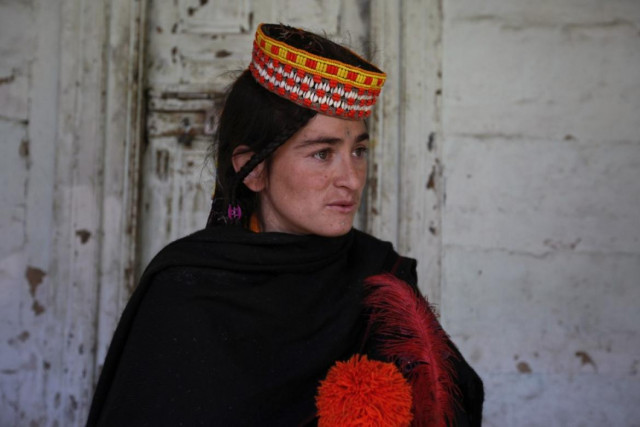Upshot of embezzlement: Kalash women robbed of essential health facilities
Contractor who was to build seclusion facilities for menstruating women fled

Menstruating women are required to go into seclusion in a separately built facility called a Bashalani. PHOTO: REUTERS
The consequences of corruption in the use of government funds appears to have no limits to the kinds of people it affects in Pakistan, including an unusually specific group of people: Kalash women who observe their culture’s tradition of going to a segregated place during their menstrual periods.
The Kalash are a tiny ethnic minority of less than 5,000 people in Chitral district, with their own religion, culture and language that dates back several thousand years. According to Kalash tradition, menstruating women are required to go into seclusion in a separately built facility called a Bashalani, and can rejoin their families after their period is over.

In 2008, the federal government, along with the government of Khyber-Pakhtunkhwa, allocated money from their respective development budgets to build 10 Bashalanis in the Kalash regions of Chitral. However, it appears that the person awarded the contract to build the Bashalanis, a Chitrali woman herself, only ever managed to build two and cannot account for what she did with the rest of the money.
“It is a joint constitutional obligation of provincial government of Khyber-Pakhtunkhwa and the federal government to take meaningful steps to preserve the Kalash culture as it is an international heritage,” said Shahzada Iftikhar, the representative of Chitral in the National Assembly and a member of the Pervez Musharraf-led All Pakistan Muslim League (APML).
The project to build the Bashalanis was initially approved by the Women’s Development Ministry in Islamabad in 2008. The government allocated Rs19.6 million for the project, which had originally been approved by the Departmental Development Committee in July 2006, during the Musharraf regime. The contract was awarded under the condition that construction be completed within two years.
Ten Bashalanis were supposed to have been constructed in three valleys of Chitral where the Kalash primarily live: Bumberet, Rumber, and Birir. A woman from Chitral, Lakshan Bibi, was awarded the contract but federal auditors say that she may never have had the qualifications or resources necessary to undertake the project.
Lakshan was paid Rs5.2 million in advance for the project, and built only two Bashalanis before disappearing from Chitral in 2011. Federal auditors say they cannot account for another Rs9.7 million in the records submitted by Lakshan before she fled. According to an aide of the Chitral Deputy Commissioner, criminal charges have been filed against her, but the police have yet to find her.
In the absence of the needed Bashalanis, women from the three valleys often have to be taken to Bashalanis that are much further away from their homes every month. For many families, that additional transportation expense can be a difficult one to bear, said Noushahideen, a spokesperson for the Kalash community.
According to Noushahideen, there are only four Bashalanis currently available, including the two constructed by Lakshan. The other two were constructed by a community committee that was constituted by the Chitral Deputy Commissioner. One more Bashalani in Birir valley is incomplete, left there by Lakshan before she fled.
Federal auditors claim that it was not possible for Lakshan to have engaged in what appears to be an act of embezzlement of public funds without assistance from officials within the government.
Shahzada Iftikhar said intends to take up the issue of this alleged embezzlement in the National Assembly as an issue of religious freedom. “The Kalasha people and their women should not be disgraced as they are also citizens of Pakistan and entitled to all the rights guaranteed to them by the constitution,” said Iftikhar.
Yet it is unclear just how much longer the Kalash women will continue to use Bashalanis. While the community has strived to keep up its centuries old traditions, even the mountains of Chitral are not immune to modernity. The prospect of using modern sanity napkins for women, the most expensive of which costs Rs130 for a pack of 10, may be significantly cheaper and more convenient than building and going to Bashalanis every month.
Published in The Express Tribune, April 15th, 2015.



















COMMENTS
Comments are moderated and generally will be posted if they are on-topic and not abusive.
For more information, please see our Comments FAQ